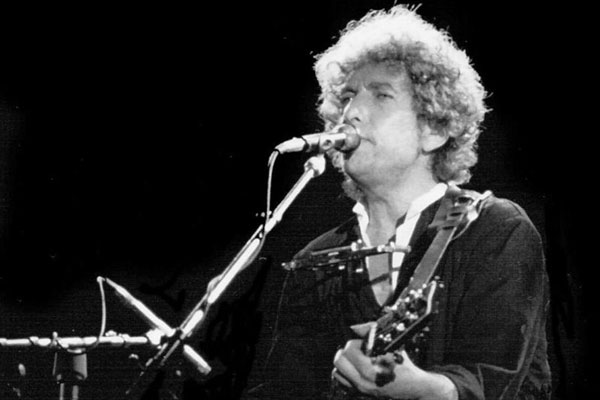Bob Dylan: a ‘singular phenomenon,’ and now a Nobel laureate

Last week, Bob Dylan was named the winner of the 2016 Nobel Prize in literature, becoming the first musician to earn the honor. According to the Nobel Committee, Dylan was selected “for having created new poetic expressions within the great American song tradition.”
The selection has raised some controversy, as some have questioned whether music should be considered literature. Dylan, whose career spans five decades, made news again this week when it was reported that the Nobel Committee has been unsuccessful in trying to reach the enigmatic musician and has given up trying to contact him.
We spoke with music industry expert David Herlihy, teaching professor in the College of Arts, Media and Design, about Dylan’s influence and the relationship between music and literature.
Where does Dylan rank in the pantheon of music history? What makes his music so impactful and influential?
Dylan ranks in the top tier of the music pantheon because of the quality of his songwriting and his impact on American society and culture.
To appreciate a musician’s place in the pantheon of music, one must first compare that musician’s body of work to the work of peers and predecessors in the same genre and then evaluate his or her cultural contribution. Dylan excels on both counts.
Dylan is a student of rock ‘n’ roll, the blues, gospel, and folk. His melodies are sweeping and memorable and his lyrics, which address political, social, and philosophical themes, revolutionized the subject matter that pop song lyrics could address. The many artists who have covered Dylan’s songs—from Peter, Paul and Mary, Sam Cooke, Nina Simone, and Doc Watson to The Byrds, Jimi Hendrix, Nico, and Nora Jones—reveal the melodic breadth and lyrical power of his compositions.
In terms of cultural impact, Bob Dylan was in the right place at the right time. Dylan arrived on the music scene in New York City in the early ’60s, at a pivotal time in the cultural development of the United States. The post-World War II era had given rise to the Cold War and spawned the so-called “Beat Generation,” associated with anti-establishment writers like Jack Kerouac, William Burroughs, and poet Allen Ginsberg. The “Beats,” were associated with a bohemian lifestyle and congregated in New York City. Greenwich Village became a hotbed for the underground, socially-conscious folk movement, which emphasized the importance of lyrical content.
Who influenced Dylan as a musician?
Dylan’s early work was influenced by prolific American songwriter Woody Guthrie, who wrote protest songs and used music as an instrument for social justice. In the ’40s and ’50s, Guthrie frequently appeared with the slogan “This Machine Kills Fascists” written on his guitar.
After Guthrie faded from the music scene in the early 1960s, folk music fans were yearning for a new songwriter to give voice to their concerns of social justice. Dylan was looking to emulate Guthrie’s lyrical-based social activism, and Greenwich Village was ground zero at a pivotal time in American history. Dylan was embraced by the folk music scene as the voice of his generation.
In 1965, Dylan released “Like A Rolling Stone,” a six-minute blast of rock ‘n’ roll that expanded the emotional range and subject matter of Top 40 music. Although Dylan was repudiated by folk fans for abandoning the protest movement and “going electric,” his tendency to follow his muse and his willingness to continually confound critics and fans alike is another measure of his greatness as an artist.
Why should music be considered literature? And what can writers learn from musicians?
I don’t think that music per se (i.e., without lyrics) should be considered literature. Music carries a mysterious emotional impact that is, in effect, beyond words. Instrumental, non-vocal music can evoke great emotional response. While I would hesitate to tell a writer how to conduct her craft, I would hope that writers would be inspired by music that moves them to write words that evoke profound emotional responses on par with great music.
While most are not questioning Dylan’s abilities, some think he shouldn’t have won the Nobel Prize in literature for his work as a musician. Do you agree with that assessment?
Musical compositions are comprised of words and music. The mere fact that lyrics are accompanied by melody should not invalidate their stature as poetry. While many songwriters’ lyrics don’t stand up when separated from the accompanying melody, Dylan’s lyrics are absolutely poetry in their own right.
Often, Nobel Prize winners are not widely known by the general public. Could Dylan’s win be a shift toward more well-known people winning?
According to the Nobel Prize website, the themes for bestowing the Nobel Prize have evolved over the years and the penchant for championing unknown masters only began in the late 1970s. I think Dylan is a singular writer, with a uniquely significant and ongoing impact on culture. I would expect that Nobel Prizes will, more often than not, still be bestowed on relatively unknown and important writers, rather than being transformed into a literary Grammy.
What other musicians do you think could win a Nobel Prize in literature?
I really can’t think of any other musician who could be awarded a Nobel Prize for literature. Again, Dylan is a singular phenomenon, and his catalog of hundreds of songs, written and composed over half a century, put him in a category all by himself.





